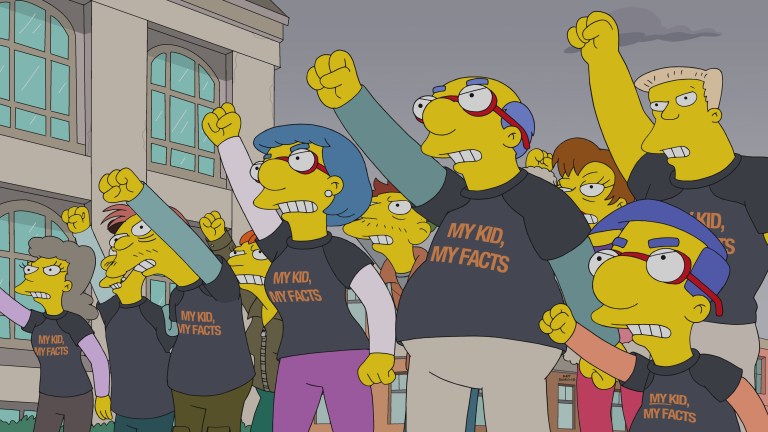The Simpsons Tries to Clean Up Springfield and Its Own Checkered History
Milhouse’s dad almost gets interesting as The Simpsons take on Springfield history in “Hostile Kirk Place.”

This The Simpsons review contains spoilers.
The Simpsons Season 34 Episode 16
The Simpsons separates facts from the state and brings down the whole gazebo. “Hostile Kirk Place” will be a divisive episode, possibly threatening closed-captioning in Florida, as Kirk Van Houten declares war on words.
Matt Selman acts like he’s got tenure on The Simpsons, the way he pushes the curriculum ever more cleverly into commentary. This episode isn’t meant to divide red from blue but cartoon fans from comedy geeks. There are so many lines which have double meaning, and yet the ones that pack the most punch are brutally single minded. In one exchange, Professor Frink is asked to dumb something he said down so everyone can understand. He desperately replies, “I am dumbing it down.” This also succinctly explains subtle differences between the wit and the humor at the heart of The Simpsons.
After Weird Al turns the couch gag into a polka party, the layout of the episode is narrated in Dr. Seuss rhymes. The work of the long-time beloved author, credited with creating some of the greatest learning tools in children’s literature, has been recently reexamined. The book-burning conclusion of Kirk Van Houten’s raze through Springfield Elementary’s curriculum speaks to both sides of would-be protectors of history.
Plotwise, the episode is extremely predictable, yet there are some surprising twists of logic. It makes sense that Kirk would turn into a fascist dictator of public knowledge. His family was on the wrong side of history, underneath it, if we’re being literal. Buried under the weight of Springfield’s Great Gazebo Tragedy, as his great-great-grandfather’s last act as mayor of the town. His last words were “my bad.” Kirk goes with the town’s motto, “A noble spirit embiggens the smallest man.” He has been cast as the perennial loser, something he’s going to pass on to Milhouse. It makes sense he wants to bury knowledge personally damaging to him, and to go mad with local power in the process.
Less likely, and more frightening, is the logic that saves the day. This was foretold in the season six episode, “Bart’s Comet,” when Homer’s initial prediction, that the apocalyptic ball of fire hurtling toward the town would burn up in the atmosphere, turns out to be true. He is as scared as his kids at his correct assessment, so when he champions science as an unyielding force of knowledge during the education dystopia, we should all be afraid.
Of course, the most fearful should be Principal Skinner, because his standoff with Nelson Muntz, speaking truth to power, is a small moment of suspenseful comic mastery. Superintendent Chalmers, however, wins no points in this installment. His record of demeaning uneasiness in the halls of education is assured. This is the guy who was appalled at all the “ugly, ugly, children” enrolling at Springfield Elementary. He now pushes Kirk to the point of no return. The only problem is, he’s actually right, and the small act of loyalty to Mayor Quimby is exactly the kind of slippery slope that topples gazebos.
Homer’s subplot of “milking the rage box out of the red hat crowd” feeds well into the main action, not only propelling it, but giving it that magnetic energy Shaquille O’Neal brings to his every endeavor. The sequence where The Simpsons takes a look at its own checkered history, from the Monorail to Lady Gaga’s visit, and including Homer’s earlier confusion over his actual age, is a fun giggle at the show itself, and a reminder not to hide from disaster, but embrace it. The episode subverts this. Kerry Washington guest stars as Rayshelle Peyton, an educational spokesman forced to ponder: “If you can’t be ashamed of the past, how can you be ashamed of the future?” Kirk’s new teaching plan promises “history is sanitized for your protection.”
There is plenty of propaganda to go around. Homer’s T-shirts have some very catchy slogans, like “Forgetting is a Privilege,” and Lisa’s response is completely in keeping with her long-held standards. She’s against it, but gets lost in the fine print. Homer’s best line is not on his copper-infused inside outerwear, “Homeschooling, every half-assed parent’s nightmare.” It is something not taught in public schools. Kirk is at his best when he tells gathered media how he is being silenced, and reveals Hans Moleman to be a crisis actor. This is new characterization for Kirk Van Houten, somewhat at odds with the pathetic loser corner he’s been painted into, but it won’t be a permanent change.
Written by Michael Price, and directed by Steven Dean Moore, “Hostile Kirk Place” is an ambitious entry, which sometimes works against itself with its cleansing purity. But it is loaded with great lines and is completely on target in the midst of a war on history. I have often criticized The Simpsons for being too “clever,” rather than funny, but in this installment, they beat us over the head with cleverness. The unsubtle assaults thrown with such nuanced timing hits a barrage of bullseyes so tiny the big laughs get muffled, but there are plenty of them.
